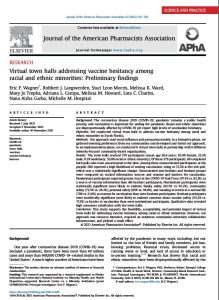Virtual Town Halls Addressing Vaccine Hesitancy Among Racial/Ethnic Minorities: Preliminary Findings.
 Abstract: Background: The coronavirus disease 2019 (COVID-19) pandemic remains a public health priority, and vaccination is important for ending the pandemic. Racial and ethnic minorities are disproportionally affected by COVID-19 yet report high levels of vaccination hesitancy. Objective: We conducted virtual town halls to address vaccine hesitancy among racial and ethnic minorities in South Florida. Methods: Our approach used social influence and persuasion models. In a formative phase, we gathered meeting preferences from our communities and developed and tested our approach. In an implementation phase, we conducted 6 virtual town halls in partnership with 6 different minority-focused community-based organizations. Results: The town halls reached 379 participants (mean age 36.6 years; 63.9% female, 33.5% male, 0.3% nonbinary; 55.7% racial or ethnic minority). Of these 379 participants, 69 completed both polls who were unvaccinated at the time. Among these nonvaccinated participants, at the prepoll, 58% reported a high likelihood of seeking vaccination, rising to 72.5% at the exit poll, which was a statistically significant change. Unvaccinated non-hesitant and hesitant groups were compared on trusted information sources and reasons and barriers for vaccination. Nonhesitant participants reported greater trust in the COVID-19 Task Force (97.2% vs. 82.3%) as a source of vaccine information than did hesitant participants. Nonhesitant participants were statistically significant more likely to endorse community safety (74.4% vs. 27.8%), personal safety (87.2% vs. 38.9%), and wanting to return to a normal life (71.8% vs. 33.3%) as reasons for vaccination than were hesitant participants. Hesitant participants were statistically significant more likely to endorse concerns about vaccine safety (61.1% vs. 17.9%) as barrier to vaccination than were nonhesitant participants. Qualitative data revealed high consumer satisfaction with the town halls. Conclusion: This study supports the feasibility, acceptability, and potential impact of virtual town halls for addressing vaccine hesitancy among racial or ethnic minorities; however, our approach was resource intensive, required an extensive community-university collaborative infrastructure, and yielded a small effect.
Abstract: Background: The coronavirus disease 2019 (COVID-19) pandemic remains a public health priority, and vaccination is important for ending the pandemic. Racial and ethnic minorities are disproportionally affected by COVID-19 yet report high levels of vaccination hesitancy. Objective: We conducted virtual town halls to address vaccine hesitancy among racial and ethnic minorities in South Florida. Methods: Our approach used social influence and persuasion models. In a formative phase, we gathered meeting preferences from our communities and developed and tested our approach. In an implementation phase, we conducted 6 virtual town halls in partnership with 6 different minority-focused community-based organizations. Results: The town halls reached 379 participants (mean age 36.6 years; 63.9% female, 33.5% male, 0.3% nonbinary; 55.7% racial or ethnic minority). Of these 379 participants, 69 completed both polls who were unvaccinated at the time. Among these nonvaccinated participants, at the prepoll, 58% reported a high likelihood of seeking vaccination, rising to 72.5% at the exit poll, which was a statistically significant change. Unvaccinated non-hesitant and hesitant groups were compared on trusted information sources and reasons and barriers for vaccination. Nonhesitant participants reported greater trust in the COVID-19 Task Force (97.2% vs. 82.3%) as a source of vaccine information than did hesitant participants. Nonhesitant participants were statistically significant more likely to endorse community safety (74.4% vs. 27.8%), personal safety (87.2% vs. 38.9%), and wanting to return to a normal life (71.8% vs. 33.3%) as reasons for vaccination than were hesitant participants. Hesitant participants were statistically significant more likely to endorse concerns about vaccine safety (61.1% vs. 17.9%) as barrier to vaccination than were nonhesitant participants. Qualitative data revealed high consumer satisfaction with the town halls. Conclusion: This study supports the feasibility, acceptability, and potential impact of virtual town halls for addressing vaccine hesitancy among racial or ethnic minorities; however, our approach was resource intensive, required an extensive community-university collaborative infrastructure, and yielded a small effect.
Wagner, E. F., Langwerden, R. J., Morris, S. L., Ward, M. K., Trepka, M. J., Campa, A. L., … & Hospital, M. M. (2021). Virtual Town Halls Addressing Vaccine Hesitancy Among Racial/Ethnic Minorities: Preliminary Findings. Journal of the American Pharmacists Association, 62(2022), 317-325. https://doi.org/10.1016/j.japh.2021.11.005

Recent Comments